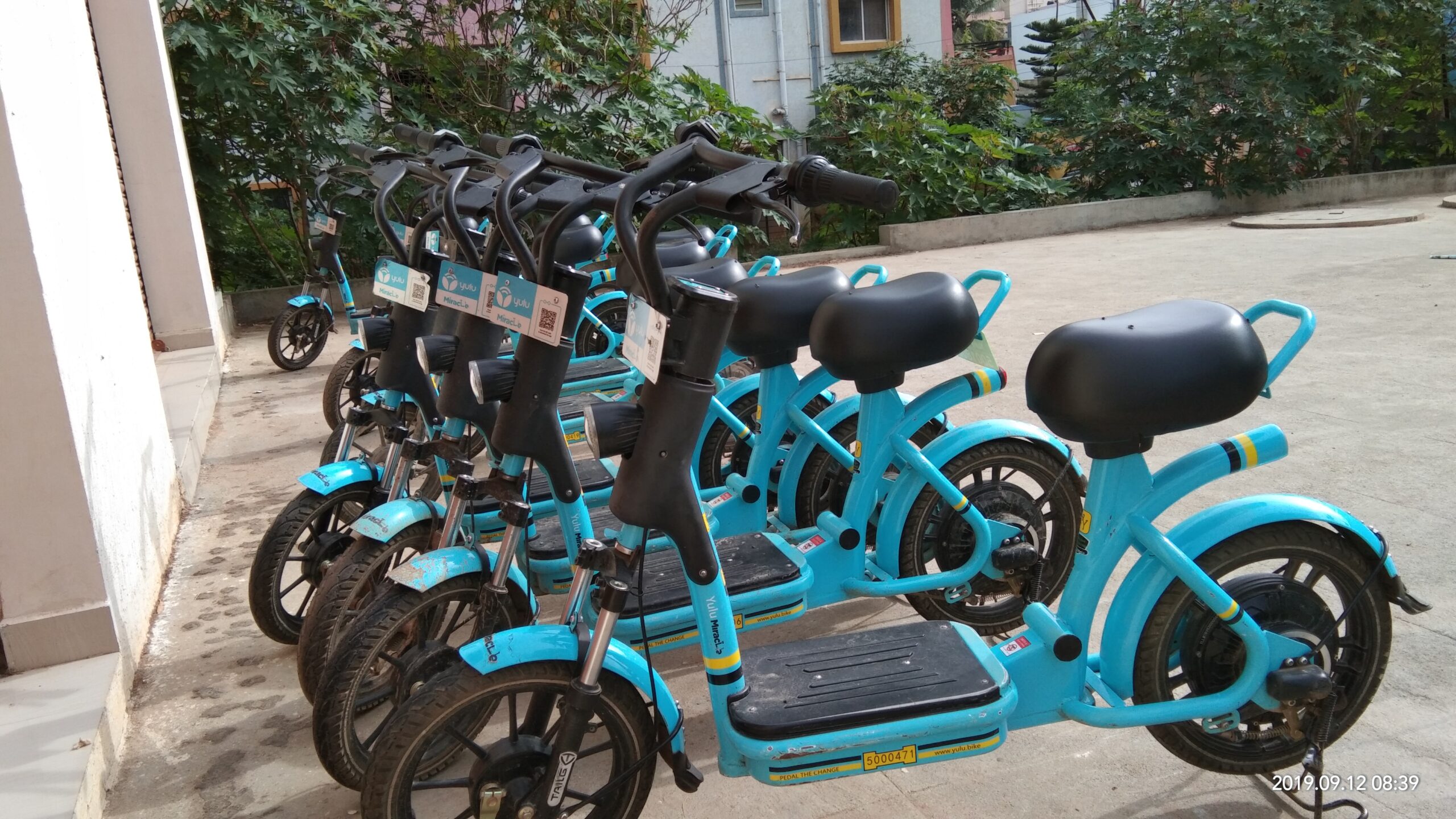Have you ever thought about the everyday cost of pollution and traffic congestion on the city residents? Every day, millions of people travel along crowded streets. Inhaling pollution fumes and facing tedious commutes. These issues put patience to test while also having a huge impact on our health and the environment.
In the search for the long term solutions these micro mobility is emerging as a light of hope. It is marking an innovation in urban mobility giving convenient and environmentally beneficial alternatives to traditional forms of transport.
Join us as we explore Yulu’s success story, name in the Indian startup environment, has made its niche in the area of Success Stories of Entrepreneurs. which is defining with its innovation and a commitment to decreasing the carbon footprint of urban transportation. Discover how Yulu is not only combating the negative consequences of pollution and traffic congestion, but also paving the path for a cleaner, more efficient future for city people around the world.
The Origin of Yulu:
The Yulu began its journey with a specific goal in mind; to solve the urban mobility challenges of traffic, congestion and Traffic and insufficient last mile connectivity. Founded in 2017 by Amit Gupt, Rk Mishra and Naveen Dachuri. So Yulu was born leveraging the cutting edge technology to create a seamless and environmentally friendly transportation option.
Yulu introduced 4 product Yulu Wynn XP an electric bike to make a ownership of the bike cost effective and which are suitable for teenager college students or working professional and Miracle for an electric bike designed for short-distance travel. With a focus on sustainability, these bikes feature swappable batteries, ensuring constant availability and reducing the carbon footprint. The DeX Green and the Yulu DEX. Bajaj Auto Ltd.’s DeX GR is India’s first electric car designed specifically for effective last-mile deliveries. It is produced on a state-of-the-art platform. With its cutting-edge technologies and practical design, it raises the bar for delivery vehicles and is engineered to maximize comfort and profitability. A sleek option created especially for gig economy workers, the Yulu DEX,meanwhile, is added to the fleet. Its large products carrier, built-in tail light, and safe mobile holder support its status as an affordable asset in urban logistics by guaranteeing easy and secure deliveries whenever needed. With their practical, high-performing answers to modern urban difficulties, these 100% Made in India items perfectly represent Yulu’s dedication to innovation and sustainability.
Innovations and Business Model:
Electric Two Wheelers:
Yulu Primarily has electric vehicle of two wheelers, including bicycles and scooters, So yulu has introduced 4 product in electric 4 wheelers segment Yulu Wynn XP an electric bike to make a ownership of the bike cost effective and which are suitable for teenager college students or working professional and Miracle for an electric bike designed for short-distance travel. With a focus on sustainability, these bikes feature swappable batteries, ensuring constant availability and reducing the carbon footprint. The DeX Green and the Yulu DEX. Bajaj Auto Ltd.’s DeX GR is India’s first electric car designed specifically for effective last-mile deliveries. It is produced on a state-of-the-art platform. With its cutting-edge technologies and practical design, it raises the bar for delivery vehicles and is engineered to maximize comfort and profitability. A sleek option created especially for gig economy workers, the Yulu DEX,meanwhile, is added to the fleet. Its large products carrier, built-in tail light, and safe mobile holder support its status as an affordable asset in urban logistics by guaranteeing easy and secure deliveries whenever needed. With their practical, high-performing answers to modern urban difficulties, these 100% Made in India items perfectly represent Yulu’s dedication to innovation and sustainability.
IOT and AI:
Yulu is taking advantage of IOT (internet of Things) and AI to improve its users’ experiences. As a result, each Yulu car is outfitted with IOT sensors that offer real-time information about its location, battery status, and maintenance requirements. This data-driven strategy provides effective fleet management and increases overall service efficiency.
Dockless System:
As compared to traditional bike sharing services, which depend on the docking stations, Yulu uses a dockless approach. Greater Flexibility and convenience are provided by the ability for users to pick up and drop off Yulu bikes at any designated parking spot. In crowded metropolitan settings where room is limited, this approach is especially helpful.
Strategic Partnership:
The partnership between Yulu and Bajaj Auto is centered on the introduction of shared mobility-focused electric scooters. Through this project, sustainable transportation options will be expanded throughout Indian cities by leveraging Yulu’s experience in micro-mobility solutions and Bajaj Auto’s production capabilities. The alliance seeks to improve accessibility to effective last-mile connectivity solutions and encourage environmentally friendly transportation in order to address urban mobility concerns.
Yulu’s strategic alliance with Zomato, a major player in meal delivery, marked a critical turning point in the company’s history. Yulu supplied electric bikes to these businesses after realizing the need for effective last-mile delivery solutions. This increased delivery efficiency and decreased operating expenses. By supporting environmentally friendly delivery options, this partnership not only increased Yulu’s market penetration but also emphasized its dedication to sustainability.
Swift Growth:
Ever since its establishment, Yulu has rapidly spread outside Bangalore and established a foothold in key Indian cities including Delhi, Pune, Bangalore, Mumbai, Chennai, Hyderabad, and Ahmedabad. The company’s expansion has been facilitated by its capacity to meet the distinct transportation requirements of every city while upholding a high standard of service quality.
Funding and Investment
Yulu has received significant funding from leading venture capital companies and corporate behemoths. In 2019, the company raised $8 million in a Series A financing led by Bajaj Auto. This infusion of finance has allowed Yulu to expand its operations, engage in R&D, and improve its technological infrastructure.
Challenges:
Although it is admirable that Yulu has succeeded, there have been difficulties along the way. Consistent growth has required striking a balance between several factors.
Regulatory Hurdles:
Navigating the regulatory landscape has been a significant challenge for Yulu. It takes constant work and modification to be in compliance with local legislation and to obtain the required approvals for fleet deployment.
Infrastructure Limitations:
The lack of dedicated cycling lanes and charging infrastructure in many cities poses a challenge to Yulu’s expansion. To get through these obstacles, funding infrastructure development and working with urban planners are essential.
User Adoption and Behavior:
Changing commuter behavior and encouraging the adoption of e-bikes and e-scooters necessitates extensive awareness campaigns and incentives. Continual interaction and instruction are necessary to develop a base of devoted customers.
Competition:
There are several companies fighting for market share in the fiercely competitive micro mobility space. Sustaining Yulu’s dominant position depends on its capacity for innovation and staying one step ahead of rivals.
Strategic Decisions and Their Impact:
Scalable Business plan:
Yulu has grown to serve a wide audience by utilizing a scalable business plan and expanding its operations to several cities. Growth has been largely driven by the ability to adapt to various metropolitan contexts.
User-Centric Approach:
Yulu has been able to consistently enhance its services by giving user demands and feedback top priority. A favorable user experience has been facilitated by improvements in customer assistance, app functionality, and vehicle design.
Sustainable Practices:
Both investors and customers have praised Yulu’s commitment to sustainability. The emphasis on cutting emissions and encouraging environmentally friendly mobility is consistent with the global movement towards environmental consciousness.
To sum up:
The success of Yulu is evidence of the possibilities of creative approaches to problems with urban mobility. Through the use of technology, the development of strategic alliances, and a steadfast dedication to sustainability, Yulu has established a standard for brand success stories within the startup ecosystem. Making decisions that are in line with its objective, overcoming obstacles, and managing trade-offs have all been part of the path. Future business owners and entrepreneurs will surely be inspired by Yulu’s impact on environmental sustainability and urban mobility as it grows and changes.


